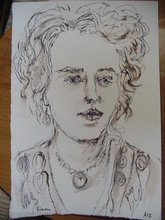All Exam Questions have a closed audience (a prof, a class) and a closed system of reference (the content of the course). In this exam, the students were instructed to spend no more than 30 minutes on a response, and to think of responses as little position papers. I offer it as the first post in this project because it's the kind of partial and possibly wrong-headed thing you are encouraged to post here. Since, after all, had the class been discussing Pound's shorter poems, or Stein's "Lifting Belly" or her book How to Write and Pounds ABC's of Reading, this might have been a very different response.
3. “Pound and Stein are phases of the same thing.”
Thesis: Um, respectfully, no.
If you are William Carlos Williams, and you are right next to Stein-Pound, the two poets could seem to be doing the same thing, on some levels. Ideologically, Stein and Pound both reject WCW’s preference for the regional and the American. Stylistically, Stein and Pound both violate English syntax. Historically, Stein and Pound are both related in their experiments to Mallarmé and the Symbolists, who had the unfortunate habit of writing ideas but not things. Both Stein and Pound demonstrated in their poetry a preoccupation with language qua language. WCW wanted (1) lines that made sense (whether or not the poem ‘coheres’ is another question), (2) images that put one in mind of contemporary objects and situations, and (3)an absence of any sort of comparison (similes, metaphors, etc.) Stein and Pound might deliver 2 and 3, but 1 they took for an option.
But this similarity doesn’t seem to go as far as WCW claims it does. Their aesthetic commitments differ in both method and ideology. Stein, methodologically, strips the world away from language as completely as she can in poems like "Tender Buttons." There are nouns and verbs and some adjectives, and the syntax will not get you to sense, and the images will not get you to a recognizable world. These poems are a world, a very sensual one, unto themselves. Further, the poems refuse to invent a world for the reader. In her prose, Stein works with a method of repetition and a slow accretion or revelation of ‘meaning’ that seems to wobble long like time and evolution itself. Pound, on the other hand, used refrains, not repetition, to punctuate poems which violated syntax mostly by mixing languages and historical moments of languages. As much of a collage as Pounds poems are, they are not Stein’s confetti. The language still gestures to the world, but to so much of it that finding one’s place in it is difficult. And, most different of all, Pound is trying to create a world. Stein avoids tropes, Pound feeds on them. Pound, ideologically, is committed to remaking the world in his image, an image of ‘total’ learning and totally coherent order which must be wrested both from history and from the current seats of power. He’s a classicist, mannerist, militarist, fascist. The Cantos is the instruction book for leading this new world order. Stein, on the other hand, sees the militarist fascist tendencies in classicism and other vagaries of the tradition and wants all that to melt away.
"Tender Buttons" is the disordered juxtaposition of objects (read: persons, contexts, aesthetics) which might coexist joyfully once Pound’s axiologies are surrendered (which is an axiological move on her part, yes, yes.) They do similar things in dissimilar ways for opposite reasons.
Subscribe to:
Post Comments (Atom)

No comments:
Post a Comment